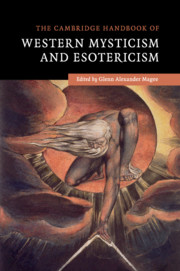Book contents
- Frontmatter
- Dedication
- Contents
- Acknowledgments
- Editor's Introduction
- List of contributors
- I ANTIQUITY
- II THE MIDDLE AGES
- III THE RENAISSANCE AND EARLY MODERNITY
- IV THE NINETEENTH CENTURY AND BEYOND
- V COMMON THREADS
- 30 Alchemy
- 31 Astrology
- 32 Gnosis
- 33 Magic
- 34 Mathematical Esotericism
- 35 Panpsychism
- 36 Sexuality
- Suggestions for Further Reading
- Index
- References
32 - Gnosis
from V - COMMON THREADS
Published online by Cambridge University Press: 05 May 2016
- Frontmatter
- Dedication
- Contents
- Acknowledgments
- Editor's Introduction
- List of contributors
- I ANTIQUITY
- II THE MIDDLE AGES
- III THE RENAISSANCE AND EARLY MODERNITY
- IV THE NINETEENTH CENTURY AND BEYOND
- V COMMON THREADS
- 30 Alchemy
- 31 Astrology
- 32 Gnosis
- 33 Magic
- 34 Mathematical Esotericism
- 35 Panpsychism
- 36 Sexuality
- Suggestions for Further Reading
- Index
- References
Summary
TO UNDERSTAND THE ROLE OF gnosis IN THE HISTORY OF Western esotericism, we must begin by detaching it from a too close and exclusive association with Gnosticism. Gnosis is Greek for “knowledge,” and in the Hellenistic milieus of Late Antiquity, it was understood more specifically as a special kind of salvific knowledge by which the soul could be liberated from its material entanglement and regain its unity with the divine Mind. The search for such salvation was by no means limited to gnostics; rather, it seems to have been the central preoccupation of a kind of “trans-confessional” cultic milieu that flourished particularly in Egypt, and whose adherents – whether they were pagans, Jews, or Christians – all interpreted (Middle) Platonic metaphysics in such a way as to transform it into religious worldviews with their own mythologies and ritual practices. This does not mean, however, that they themselves considered their religious beliefs as something new: On the contrary, the common assumption in this period was that the oldest was always best, and therefore the most ancient sages had been closest to divine truth. Accordingly, even Plato himself was not supposed to have been an original thinker, but merely an important link in the chain of transmission of the ancient and universal spiritual wisdom, the origins of which could be traced back to the most ancient “barbarian” peoples of the Orient and their legendary sages: notably Hermes Trismegistus in Egypt and Zoroaster in Persia. To distinguish such perspectives from strictly philosophical Platonism, they will be referred to here as “Platonic Orientalism.”
Scholars have long tended to discuss this entire milieu in rather denigrating terms as an “underworld” of Platonism, a “murky area” full of “sub-philosophical phenomena,” although we are clearly dealing with religious phenomena that should not be judged by the yardstick of philosophical rationalism but deserve to be taken seriously on their own terms. Traditional prejudices in this regard have slowly begun to vanish in recent scholarship, but what still remains is a tendency to focus more or less exclusively on philosophical and doctrinal matters while downplaying or ignoring the fact that when it comes to grasping the true mysteries of divinity, the sources never cease to emphasize the total inadequacy of discursive language.
- Type
- Chapter
- Information
- The Cambridge Handbook of Western Mysticism and Esotericism , pp. 381 - 392Publisher: Cambridge University PressPrint publication year: 2016
References
- 3
- Cited by



